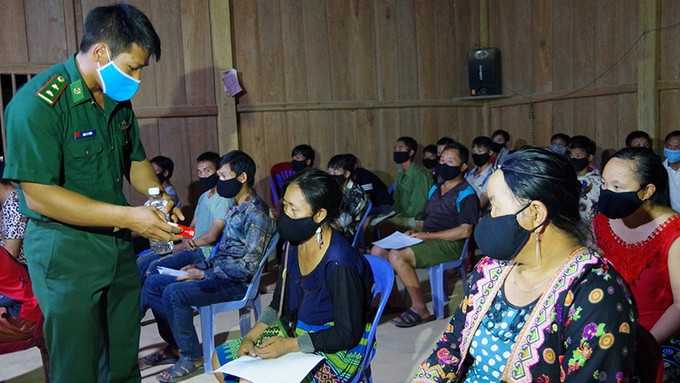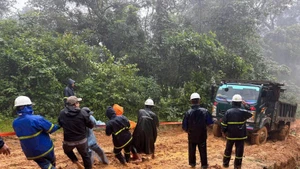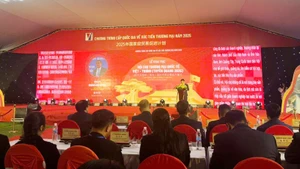Therefore, in addition to the enhancement of investment resources and improvement of medical examination and treatment conditions amid complicated development of COVID-19 epidemic, the localities have been focusing on tightening the protection and expansion of “green zones” to ensure the safety and efficiency of production while stabilising the lives of people from all ethnic groups.
Protecting achievements of the fight against the epidemic
According to the head of the police of Bang Thanh Commune in Pac Nam District, Bac Kan Province, in recent time, the number of locals heading to domestic industrial zones or illegally crossing the border for work in China has been extremely high. The communal authorities have propagated epidemic prevention and control measures among people of minority groups; established quarantine checkpoints in villages bordering Cao Bang Province; and counted and monitored the health of 16 people attempting illegal exit and 224 people returning home from working far away. As a result, no COVID-19 infections have been recorded in the locality. Phu Yen District in Son La Province is applying social distancing under the Prime Minister’s Directive No.16 due to two recently discovered COVID-19 cases. The district has also conducted vaccination for more than 3,000 workers and helped them to feel secure in production.
In order to effectively prevent the epidemic, the provinces have focused on strict medical control, Bac Kan has set up six medical checkpoints at gateways while Son La established five inter-sectoral checkpoints at border gates. In addition, Cao Bang Province formed 130 fixed checkpoints as well as many auxiliary ones along the border lines and six others on national highways. Meanwhile, Tuyen Quang has maintained 57 checkpoints on five national highways and district level, inter-district and inter-commune roads. Dien Bien also conducted 76 groups as well as fixed and mobile controlling checkpoints in all communes in the border area. Despite simple checkpoints and extreme weather, members of the working groups did not mind the difficulties in carrying out their tasks.
In many provinces, community-based COVID-19 prevention and control groups were established. Accordingly, their members, who include cadres of residential areas, villages and hamlets, are responsible for mobilising and guiding local people to prevent and control the epidemic as well as supporting functional agencies in tracing. Bac Kan has 1,634 groups with over 5,500 members. Meanwhile, Son La has established 3,586 groups. The localities have also accelerated the vaccination. As a result, Cao Bang is now the only province in the country reporting no cases of COVID-19 infection in the community. Other provinces are basically “green zones”.
Maintaining stable production
In the northern mountainous provinces, agriculture and forestry accounts for a large proportion of production. Their consumption markets are mainly big cities such as Hanoi and Ho Chi Minh City. The complicated COVID-19 epidemic has seriously affected the production. In this context, the localities have made efforts to take advantage of “golden” time to protect “green zones” towards stabilising production. The provinces have reviewed the area, output and season for harvest as well as lists of agricultural products to propose for the support of central ministries and agencies in the consumption of products in the domestic market and for export and bringing products to e-commerce platforms. So far, Son La consumed 235,000 tonnes of fruits of all kinds; 76,345 tonnes of rice; 607,485 tonnes of sugarcane; 148 tonnes of soybeans; over 100,000 tonnes of vegetables; and 21,199 tonnes of fresh tea buds.

Processing agricultural products at Vietnam Misaki Limited Company in Thanh Binh Industrial Zone in Bac Kan Province. (Photo: Tuan Son/NDO)
Deputy Director of Cao Bang Iron and Steel Joint Stock Company Nguyen Van Tuan said that thanks to efforts to maintain “green zones”, the company’s production activities have not been stagnant. Since the beginning of the year, the company has produced over 103,000 tonnes of steel billet with total revenue of VND1.723 trillion, while contributing nearly VND65 billion to the State budget and donating nearly VND200 million to COVID-19 prevention and control fund.
Customs clearance operations have not been interrupted. As of August 15, the total import and export turnover of goods through Cao Bang Province reached over US$311 million, of which US$255 million is from the export of frozen seafood and agricultural products. In a short time, Bac Kan has implemented instructions and registered a “green transport channel” connected with the national “green channel” to ensure the circulation of goods. Since the beginning of the year, Vietnam Misaki Limited Company in the province has exported over 240 tonnes of specialties to Japan and is expanding the material growing area in northern mountainous provinces thanks to the favourable conditions created by the provincial authorities.
Actively grasping and carefully reviewing the epidemic’s development, the provinces have promptly adjusted the growth scenario in 2021 to ensure the implementation of the dual goals. Specifically, they have given priority to the development in large-scale agricultural and forestry production areas; removed difficulties and obstacles for the enterprises in a timely manner, especially the stabilisation of production activities at facilities in green zones; promoted investment attraction; and enhanced the market linkage to help people and enterprises to consume products.
Leaders of Dien Bien Province said that the fourth quarter of 2021 will be the “golden time” for growth because the investment projects whose procedures have been basically completed will be constructed. The province is creating favourable conditions related to policies and administrative procedures to attract more investment towards raising the growth rate of gross domestic product in the fourth quarter to about 12%.
The reality of COVID-19 prevention and control in northern mountainous provinces showed that scattered populations provide favourable conditions to cut off the chain of disease transmission as the quarantine and blockade measures are applied. However, the wide terrain has forced functional forces to disperse while the resources and medical facilities are limited.
The epidemic caused lower economic growth in the provinces in the first six months of the year compared to the same period last year. A number of industrial products and exports witnessed lower growth than planned. Meanwhile, the implementation progress of some hydropower projects was slow. In key tourist areas in the provinces of Dien Bien, Tuyen Quang and Cao Bang, many homestays and hotels had to close temporarily.
Therefore, the protection of “green zones” and safe production as well as the prevention of the spread of “red zones” are the long-term tasks for mountainous provinces. According to Secretary of Tuyen Quang Provincial Party Committee Chau Van Lam, it is crucial to ensure flexibility between epidemic prevention and control and economic development. In the immediate future, a commodity information system will be established to introduce and consume the products, especially the agricultural products of their strengths, via social networks. The epidemic control measures will continue to be conducted strictly but avoiding the affection to the consumption of products.
In addition, the localities will continue to speed up the progress of investment procedures and site clearance to carry out projects related to paper, pulp and wood processing plants. New hydroelectric plants will be put into operation and new industrial clusters will be formed. Meanwhile, technical infrastructure of industrial zones and clusters in the localities are being perfected. The northern mountainous provinces are determined to maintain their achievements as “green zones” in the country’s COVID-19 fight.
















